This article provides a professional guide to 10+ Top Email Marketing Platforms. If you wish to explore each option in detail and discover expert suggestions, continue reading for a complete breakdown.
In today’s digital-first market, email marketing remains one of the most reliable and profitable channels for businesses. From startups and small businesses to global enterprises, brands continue to rely on email to build stronger customer relationships, deliver personalised offers, and drive consistent sales.
With dozens of platforms available, selecting the right email marketing software can feel confusing. Some tools are designed for beginners, some for eCommerce stores, and others for enterprises that require advanced automation.
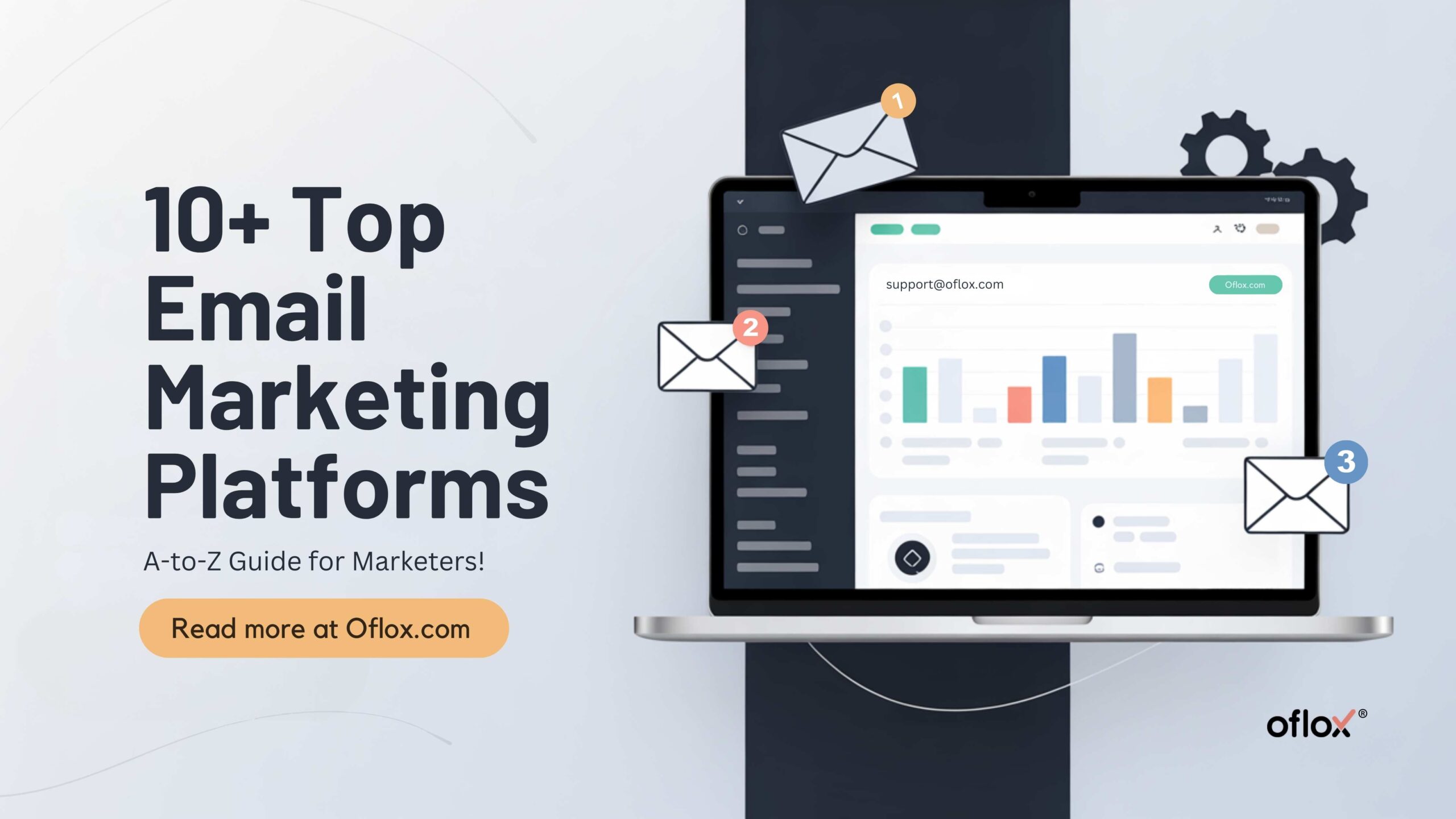
We’re exploring “10+ Top Email Marketing Platforms” in this article, with all the key information at your fingertips.
Let’s explore it together!
Table of Contents
10+ Top Email Marketing Platforms
Here are the top 10+ email marketing platforms that businesses across the globe — and especially in India — trust for growth and success.
1. SendPulse
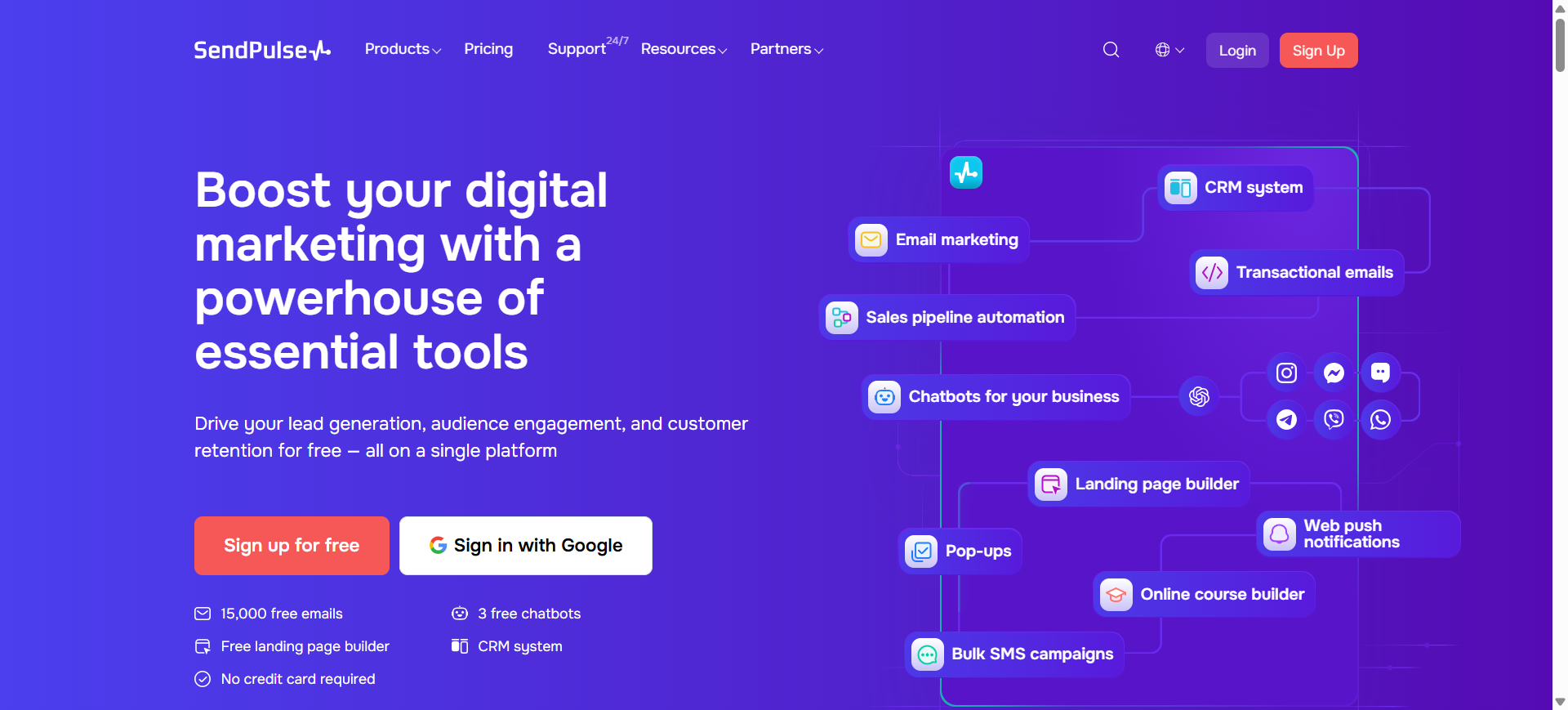
SendPulse is an all-in-one marketing automation platform known for its multi-channel messaging support. Founded in 2015 in Ukraine, it has grown into a global platform with over 3 million users. The platform lets businesses send emails, SMS, and web push notifications, and it supports creating chatbots for Facebook Messenger, Instagram, WhatsApp, Telegram, and Viber. In fact, SendPulse users send over 1.2 billion emails and 300 million chatbot messages each month – a testament to its large user base.
- Multi-Channel Messaging: SendPulse offers not just email marketing but also SMS campaigns, web push notifications, and chatbots all in one platform. If reaching customers via text or app is important, SendPulse lets you do it natively without extra integrations.
- Pricing: The free plan includes up to 500 subscribers and 15,000 emails per month. Paid plans start at about $8/month for the Email plan (500 subscribers) and scale based on list size and channels used (email, SMS, or Push).
- Unique Selling Point: Integrated multi-channel platform. SendPulse’s standout feature is its ability to send email, SMS, push notifications, and chatbot messages from one dashboard. This cross-channel approach is rare among email tools, making it ideal for businesses that want to engage customers everywhere.
- Ease-of-use. You don’t need to code or have any special skills to send a professional email campaign because the service provides an intuitive drag-and-drop builder. Alternatively, you can use a pre-designed email template from a big template library.
- AI-Powered Content: It includes an AI email content generator that helps beginners write campaign copy quickly. This AI tool can suggest subject lines and email content (even SMS copy), using machine learning to improve engagement.
- Automation Workflows: SendPulse’s Visual Automation 360 lets you build multi-step customer journeys across channels (email, SMS, web push, chatbot) and supports advanced segmentation to target contacts by behavior or attributes.
- Integrations & CRM: SendPulse comes with a built-in CRM system and connects to popular services via Zapier (Shopify, WordPress, etc.). This means you can track leads in one place and automate follow-ups across email, SMS, and chat without coding.
- Multichannel subscription forms. Sendpulse lets you design eye-catching subscription forms to collect prospects’ data for contacting them via email, SMS, and chatbots for free.
- Flexible and friendly customer support. You can easily contact the support team via live chat or phone 24/7. Their team speaks multiple languages, so you won’t have any trouble.
2. Mailchimp
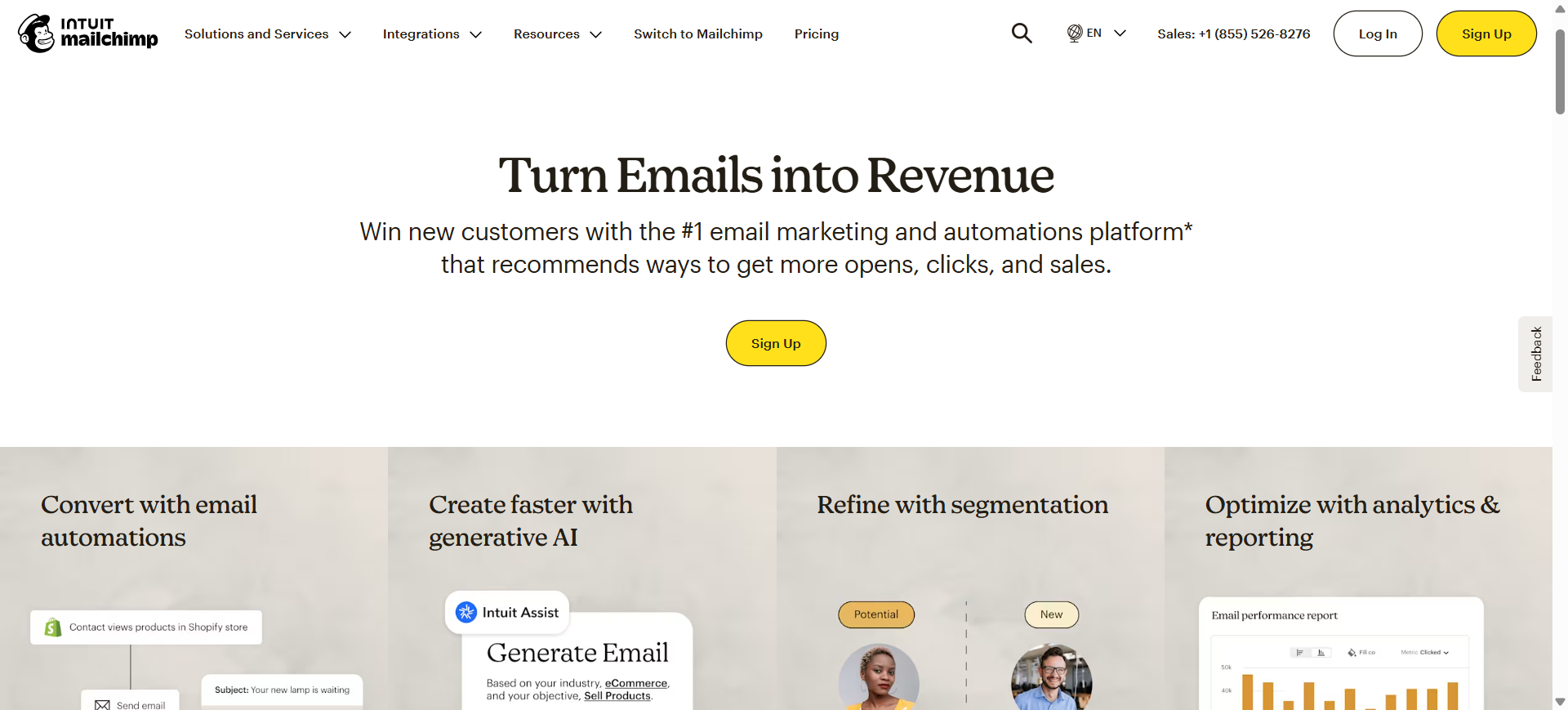
Mailchimp is one of the oldest and most popular email marketing services. Launched in 2001, it famously grew (without outside funding) to support over 12 million customers worldwide. Mailchimp offers an easy-to-use interface, a rich template gallery, and basic automation features, which is why many small businesses and startups choose it. It still caters primarily to email marketing – recent additions include basic CRM, online ads, and a postcard tool, but its strength is ease and design.
- Email Marketing Only: Mailchimp’s core is email campaigns and newsletters. It does not offer built-in SMS, push notifications or chatbots (SMS can be added via paid integrations or Mandrill). Unlike SendPulse, Mailchimp focuses on email (and related ads), not multi-channel messaging.
- AI & Content Tools: Mailchimp doesn’t emphasize AI content generation. It has some AI-driven recommendations (like content optimization suggestions), but nothing comparable to SendPulse’s or AWeber’s email generators. It relies on its large template library and design tools for ease of use.
- Automation: Mailchimp provides standard automations for welcome emails, abandoned carts (when connected to an e-commerce store), and birthday or date-based campaigns. It also supports basic audience segmentation and A/B testing in higher plans. However, its automation is generally simpler than platforms like ActiveCampaign.
- Pricing: Mailchimp’s free plan covers up to 500 contacts and 1,000 email sends per month. Paid plans start around $13/month for the Essentials plan (500 contacts) and scale by subscriber count.
- Unique Selling Point: Brand recognition and usability. Mailchimp is known for its friendly, intuitive UI and extensive educational resources. It has strong design tools and templates, making it a go-to choice for beginners who want polished email designs. Its large user community means plenty of tutorials, integrations, and plugins are available.
3. ActiveCampaign
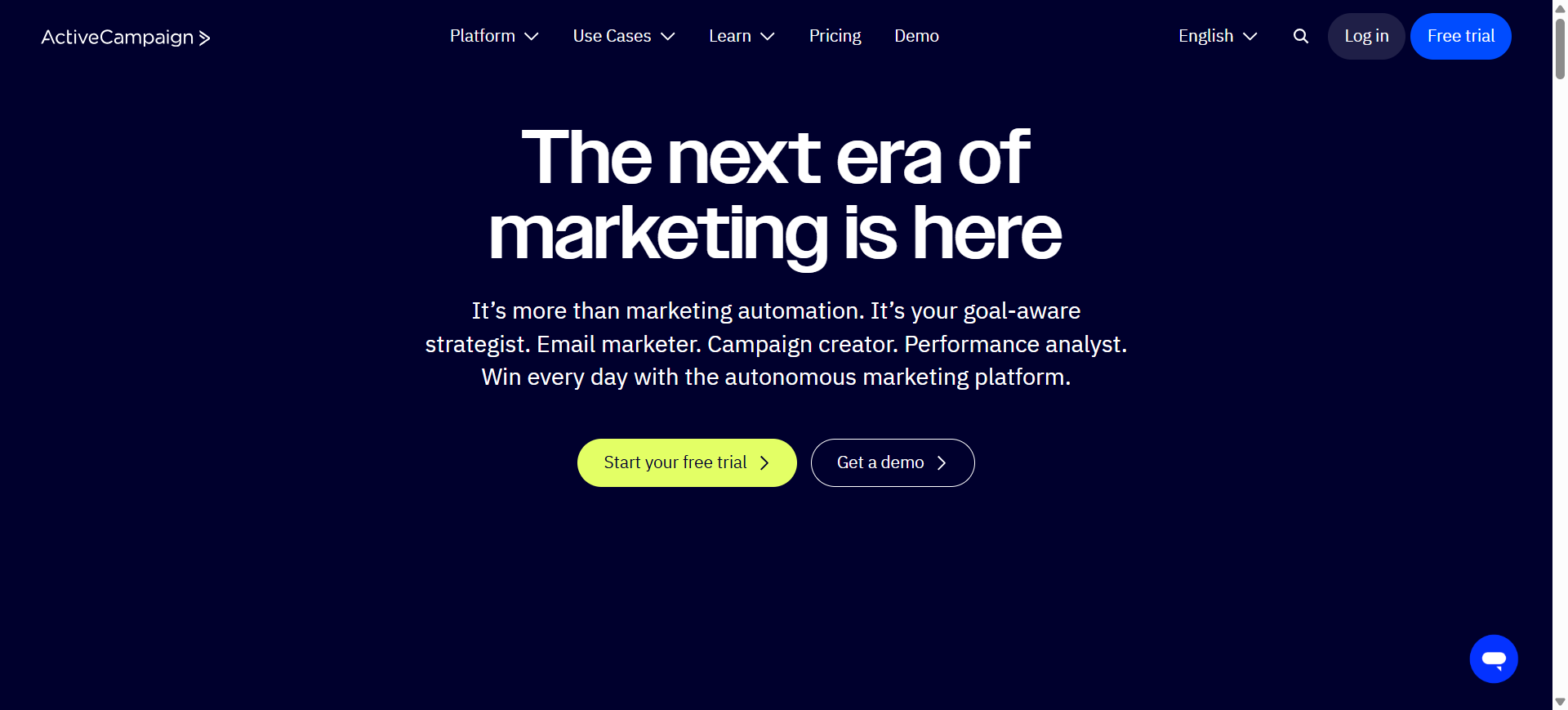
ActiveCampaign combines email marketing with a full-featured CRM and deep automation. Founded in 2003, it is widely used by businesses that want advanced customer journey mapping. The company now serves over 185,000 customers globally. Its platform emphasizes Customer Experience Automation – not just sending emails, but automating sales and support workflows. For example, ActiveCampaign can trigger tasks in the CRM or send targeted emails based on complex conditions (site activity, deal stage, etc.).
- Multi-Channel: ActiveCampaign primarily focuses on email and site messaging (popups, on-site messages). It can send SMS through integrations (e.g. Twilio), but it does not have native web push or chatbot builders. The strength is in email plus an integrated CRM, rather than broad channel coverage.
- AI & Content: ActiveCampaign isn’t chiefly an AI copy tool. It offers predictive features (like predicting best send times or win probabilities), but does not auto-write emails. Its emphasis is on data-driven automation (e.g. lead scoring) rather than AI content generation.
- Automation: This is ActiveCampaign’s biggest strength. Its workflow builder is industry-leading – you can create complex, conditional flows that branch based on almost any trigger (form submission, tag applied, purchase, etc.). It supports advanced segmentation, split-testing within automations, and detailed email analytics. The built-in CRM lets you automate sales processes (deals, tasks, notifications) alongside email marketing.
- Pricing: There is no free tier (14-day free trial only). Paid plans start at about $15/month (1,000 contacts) and increase with contact count and features (Plus, Professional, Enterprise).
- Unique Selling Point: Advanced automation & CRM. ActiveCampaign’s USP is its depth of automation and sales CRM integration. It empowers businesses to automate end-to-end customer journeys – from lead capture to purchase and follow-up. It isn’t the simplest tool, but it’s unmatched for power and customization once set up.
4. GetResponse
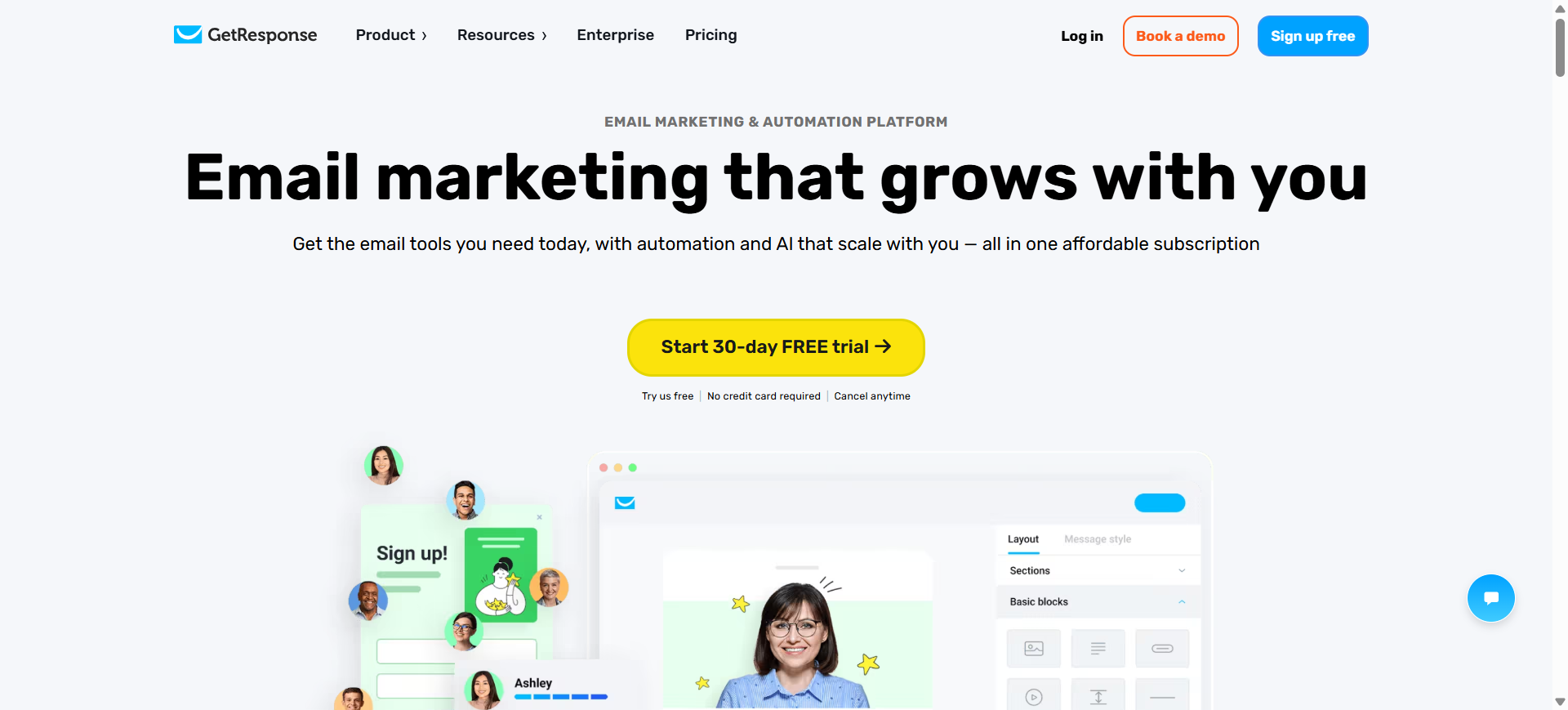
GetResponse is an all-in-one marketing platform founded in 1998 in Poland. It now serves around 350,000 customers in 183 countries. GetResponse stands out for integrating webinars and conversion funnels into the email marketing experience. Higher-tier plans include a built-in webinar platform, and there is a unique “conversion funnel” builder that combines landing pages, email, and a shopping cart in one workflow. It also offers AI-assisted features, such as an AI email content generator and an AI course builder, to speed up campaign creation.
- Multi-Channel: GetResponse focuses on email marketing but has added SMS and web push notifications. You can send SMS via integration, and web push notifications are available on paid plans, giving some multichannel reach. It doesn’t have native chatbots or social posting, but covers email + SMS + push for engagement.
- AI & Content: GetResponse includes several AI tools. It has an AI writer for emails and an AI course creator (turning outlines into course content). It also acquired technology for product recommendation pop-ups. These AI tools help generate email subject lines, body copy, and even paid ads, similar to SendPulse’s AI content features.
- Automation: GetResponse provides robust automation. In addition to regular drip sequences, it offers the Conversion Funnel, which automates landing pages, lead magnet delivery, email sequences, and a payment interface for digital products. It also integrates webinars into automation (e.g. follow-up emails for registrants). Triggers and conditions allow sophisticated sequences (like tagging contacts who click specific links).
- Pricing: There is no free plan, but you can test the service using a 30-day free trial. Paid plans start at €13/month for 1,000 contacts (Email Marketing package) and scale with list size.
- Unique Selling Point: Webinars & funnels built-in. GetResponse’s standout feature is its all-in-one approach for webinars and sales funnels. If your marketing involves webinars or selling digital products via funnels, GetResponse seamlessly integrates these with email marketing.
5. Mailmodo

Mailmodo is an AI-powered email marketing software that helps you create, automate, and optimize campaigns effortlessly. From planning strategy to writing copy and building journeys, Mailmodo’s AI Agents handle it all, with no technical expertise needed. It’s the fastest way to send smart, interactive, and high-performing emails.
Multi-Channel:
- Mailmodo enables brands to run large-scale bulk email campaigns such as newsletters, product updates, promotional blasts, and announcements.
- With AMP and interactive email capabilities, users experience app-like engagement directly inside the inbox—reducing the need to rely on multiple external channels.
AI & Content Creation:
- AI Email Assistant: Users can plan entire campaign strategies, draft subject lines, and create contextual copy through simple chat prompts—no manual writing needed.
- AI-Powered Email Builder: Generate polished, on-brand email designs in seconds or instantly remix existing templates with AI commands.
- AI Segmentation: Just describe your audience, and Mailmodo’s AI auto-creates precise, data-backed segments for personalization and better targeting.
- AI Analytics: Mailmodo transforms raw performance data into easy-to-understand insights with clear optimization recommendations.
Automation:
- Smart Email Automation: Create sophisticated customer journeys with AI-suggested workflows and pre-filled templates—easily editable at any time.
- Drag-and-Drop Editor: Build or customize emails visually using a WYSIWYG interface and preview them live for design consistency.
- AMP & Interactive Emails: Add forms, polls, surveys, and product showcases inside emails to increase conversions without landing pages.
Pricing:
- Mailmodo offers tiered pricing plans starting at $39/month under the Lite plan.
- A forever-free plan is available with limited features, making it beginner-friendly and low-risk to start with.
Unique Selling Points (USP):
- AI-first email platform: From copywriting to segmentation and analytics, Mailmodo uses AI across the entire workflow.
- AMP & interactive emails: One of the few tools enabling no-code, app-like interactive emails that boost engagement.
- Complete journey creation: AI-powered journeys + drag-and-drop builder simplify automation for beginners and busy teams.
- Strong deliverability: Smart sending logic and high-quality infrastructure help emails land in inboxes, not spam.
All-in-one execution: Build, automate, segment, analyze, and send email campaigns—no need for extra tools.
6. Constant Contact
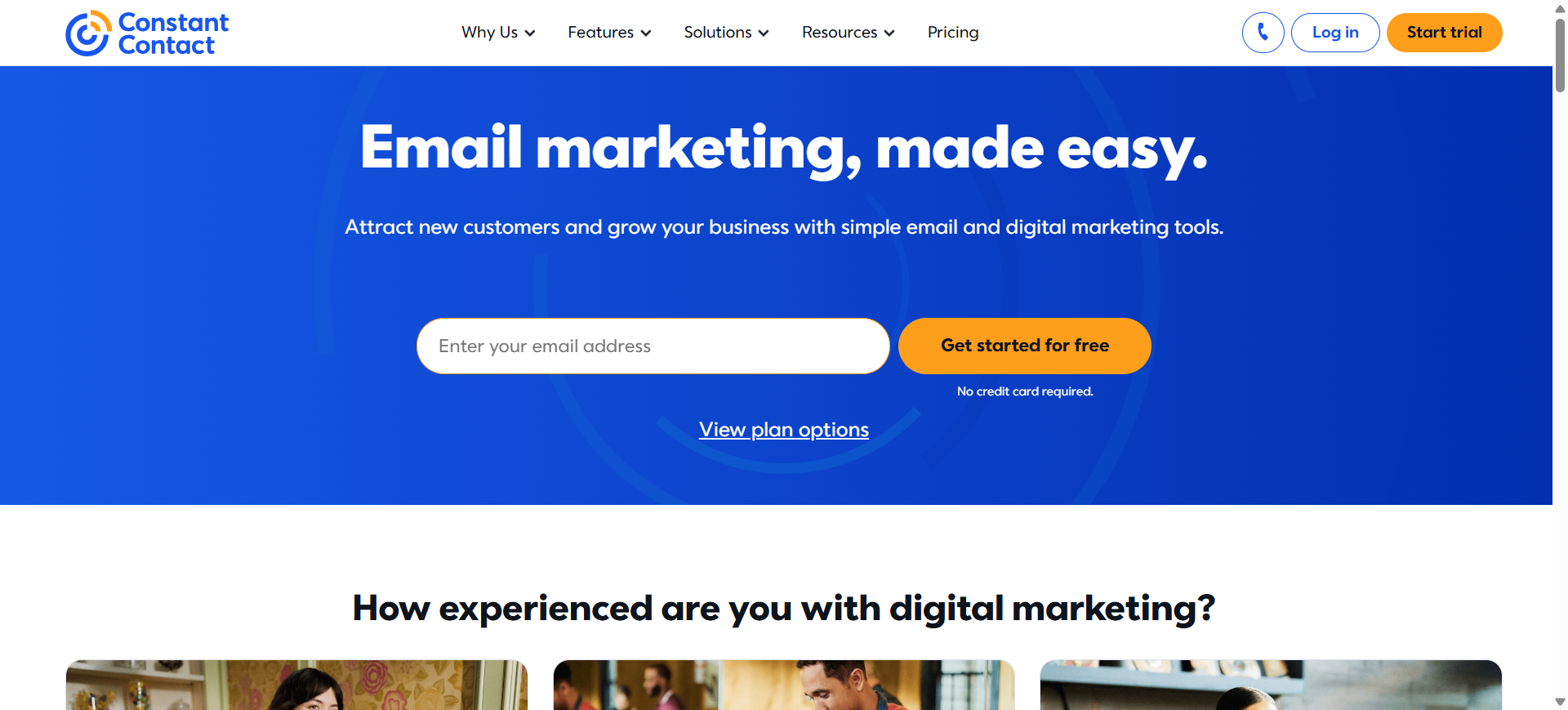
Constant Contact has been a staple in email marketing since 1995. For over 25 years, it has focused on empowering small businesses and nonprofits. Today, it offers a full suite of marketing tools – email, social media ads, event management, and more – all designed for users with limited technical expertise.
- Multi-Channel: Constant Contact’s core is email and SMS marketing. It also offers social media posting and Facebook/Instagram ads directly from the platform, plus event registrations (invitations/RSVPs) and surveys. It doesn’t have web push or chatbots. However, it integrates with SMS providers and social channels, aiming to cover common SMB marketing needs.
- AI & Content: It doesn’t emphasize AI content features. The platform focuses on user-friendly email editors and templates.
- Automation: Constant Contact provides standard automation (welcome series, drip emails, abandoned cart via integration). It also includes event marketing tools – the ability to create and manage events, send invites, and track attendees – which is unique among email platforms. Its customer support (free phone and chat help) is highly rated, reflecting its emphasis on guided assistance.
- Pricing: A 14-day free trial is available. Paid plans start at about $12/month for 500 contacts (Lite plan). Pricing is per contact and includes unlimited email sends.
- Unique Selling Point: Event and small-business focus. Constant Contact’s USP is its comprehensive toolkit for SMBs. Beyond email, it has built-in event management, surveys, and direct social ad creation. It also emphasizes live customer support and coaching, which many small business owners appreciate.
7. AWeber

AWeber is another veteran, founded in 1998. It was one of the first companies to popularize autoresponder sequences. Today AWeber serves over 1 million customers worldwide, and it remains a popular choice for small businesses and hobbyists. The company is known for its reliability, deliverability, and award-winning customer support (24/7 via phone, chat, email).
- Multi-Channel: AWeber focuses on email and recently added SMS campaigns (via Twilio integration). It also offers a landing page builder and simple web push notifications. It does not have native chatbots or extensive multichannel campaigns – it’s primarily email-centric with basic extras.
- AI & Content: Uniquely among these tools, AWeber includes an AI-powered email assistant. This feature can generate email copy from a prompt, helping create subject lines and content. It also has a library of email templates.
- Automation: AWeber provides straightforward automations: autoresponder sequences, broadcast campaigns, tagging subscribers, and segmenting lists. Its visual automation builder (“Campaigns”) is beginner-friendly. It doesn’t match ActiveCampaign’s complexity, but it covers essential workflows easily.
- Pricing: There’s no free plan, but you can test the service using a 14-day free trial. Paid plans start at $12.50/month for 500 subscribers (Lite plan, billed annually). Pricing is per subscriber.
- Unique Selling Point: Support and deliverability. AWeber’s USP is its proven reliability and customer support. It boasts high inbox deliverability (thanks to its long-established reputation) and offers 24/7 support with real people (rare in this industry). Its AI email copywriter is a nice bonus for content creation.
8. Omnisend
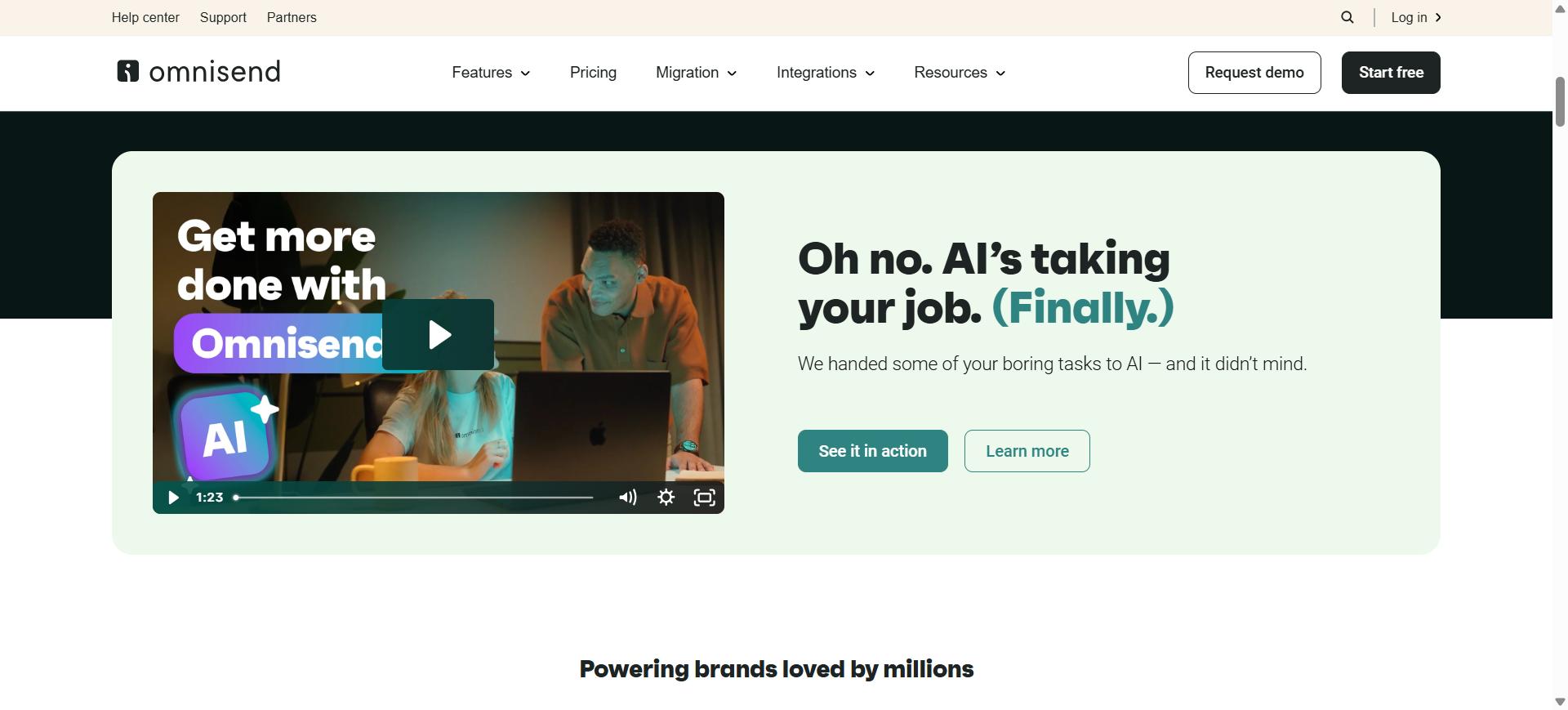
Omnisend is an email and SMS marketing platform built for e-commerce. Launched in 2014, it has quickly grown; over 150,000+ brands now use Omnisend every day. It is designed to integrate seamlessly with online stores (Shopify, BigCommerce, WooCommerce, etc.) and to automate marketing across email, SMS, and web push.
- Multi-Channel: Omnisend’s core strength is true omnichannel: it supports email, SMS, and web push notifications. You can include any or all of these in the same automated workflow. For example, an abandoned cart sequence might send an email, then an SMS, then a push notification. (This is similar to SendPulse’s multi-channel ability, but tailored to e-commerce contexts.)
- AI & Content: Omnisend does not emphasize AI copywriting tools. Instead, it provides extensive pre-built workflow templates for e-commerce (welcome series, cart recovery, product replenishment) and dynamic content (like personalized product recommendation blocks).
- Automation: Omnisend offers advanced automation flows for online stores. It has pre-built automation templates and allows custom workflows triggered by shop events. You can segment users by purchase behavior, set up coupons or loyalty automations, and analyze conversion reports. It excels at revenue tracking through email/SMS campaigns.
- Pricing: The free plan includes up to 250 contacts and 500 emails/month, plus 500 web push notifications. Paid plans start at $11,20/month for 500 contacts (Standard plan, includes email & SMS). Pricing is based on contacts and channels.
- Unique Selling Point: Ecommerce-centric automation. Omnisend’s USP is its deep integration with online stores and its ability to automate across channels specifically for e-commerce. If you sell products online, Omnisend’s workflows (abandoned cart, order follow-up, cross-sell) and multichannel messaging can boost sales effectively.
9. ConvertKit (Kit)
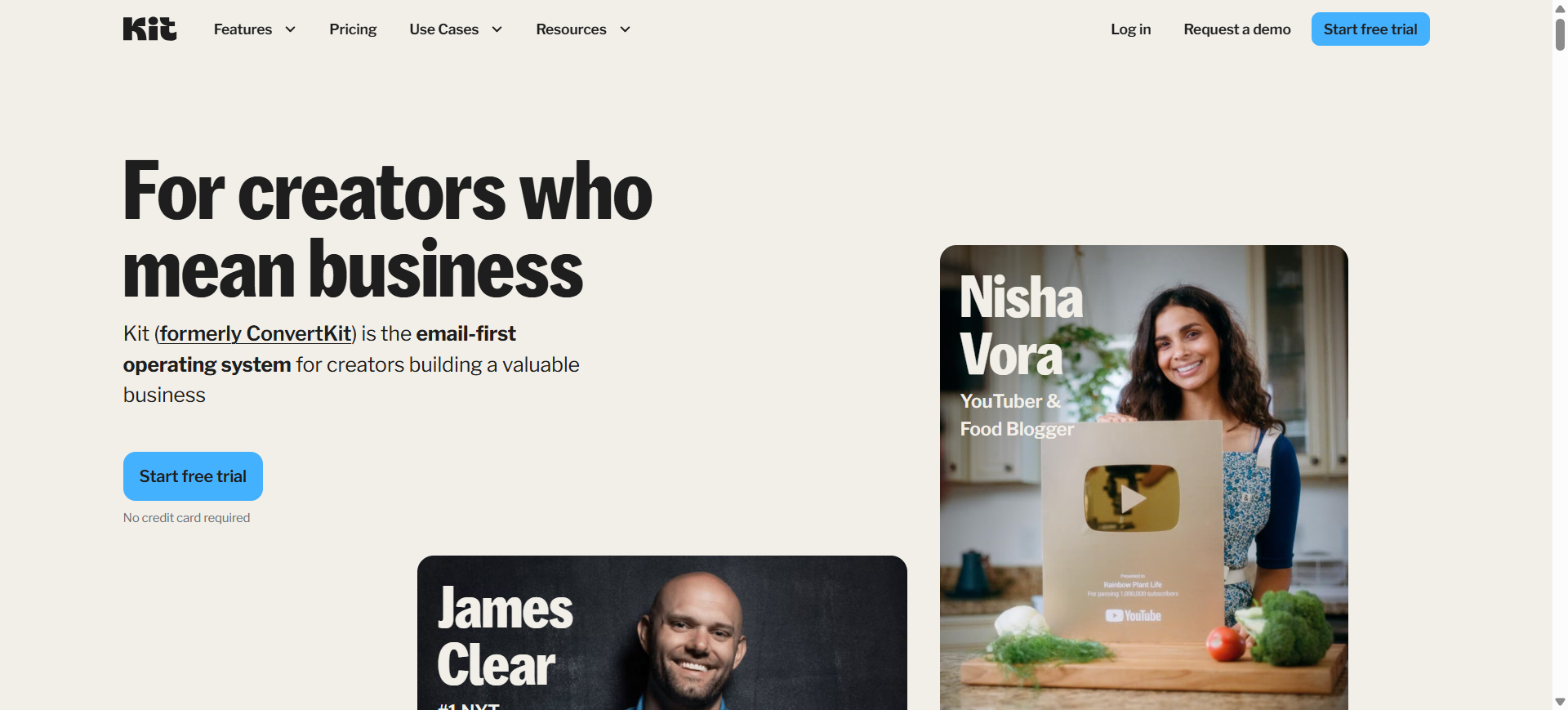
ConvertKit (recently rebranded as Kit) is an email marketing platform built for creators – bloggers, YouTubers, course authors, and other content creators. Founded in 2013, it has focused on simplifying email for individuals selling digital products or memberships. Its interface is clean and minimalist, emphasizing ease of newsletter management and tagging.
- Multi-Channel: Kit is centered on email newsletters and broadcasts. It does not offer SMS, push notifications, or chatbots. It does integrate basic commerce: you can sell digital downloads or subscriptions via “Kit Commerce,” but it’s still email-only for messaging.
- AI & Content: Kit does not offer significant AI writing features. It relies on simple templates and personalized content via tags and fields.
- Automation: ConvertKit provides a visual automation builder that is flexible yet user-friendly. It allows advanced tagging of subscribers, if-this-then-that funnels, and logic branches. A distinctive feature is the ability to sell digital products or subscriptions directly: you can attach a product to an email and handle payments within Kit. It also supports multiple newsletters within one account.
- Pricing: The free plan covers up to 10,000 subscribers (with unlimited emails). Paid plans start at $50/month for 1,000 subscribers (Creator plan). Pricing scales per subscriber.
- Unique Selling Point: Creator and commerce focus. ConvertKit’s USP is catering specifically to content creators. It offers powerful tagging/segmentation, easy newsletter creation, and built-in tools for selling ebooks, courses, or memberships via email. Its emphasis on simplicity and creator-specific features (like the Creator Network) sets it apart from general-purpose email tools.
10. Brevo (formerly Sendinblue)
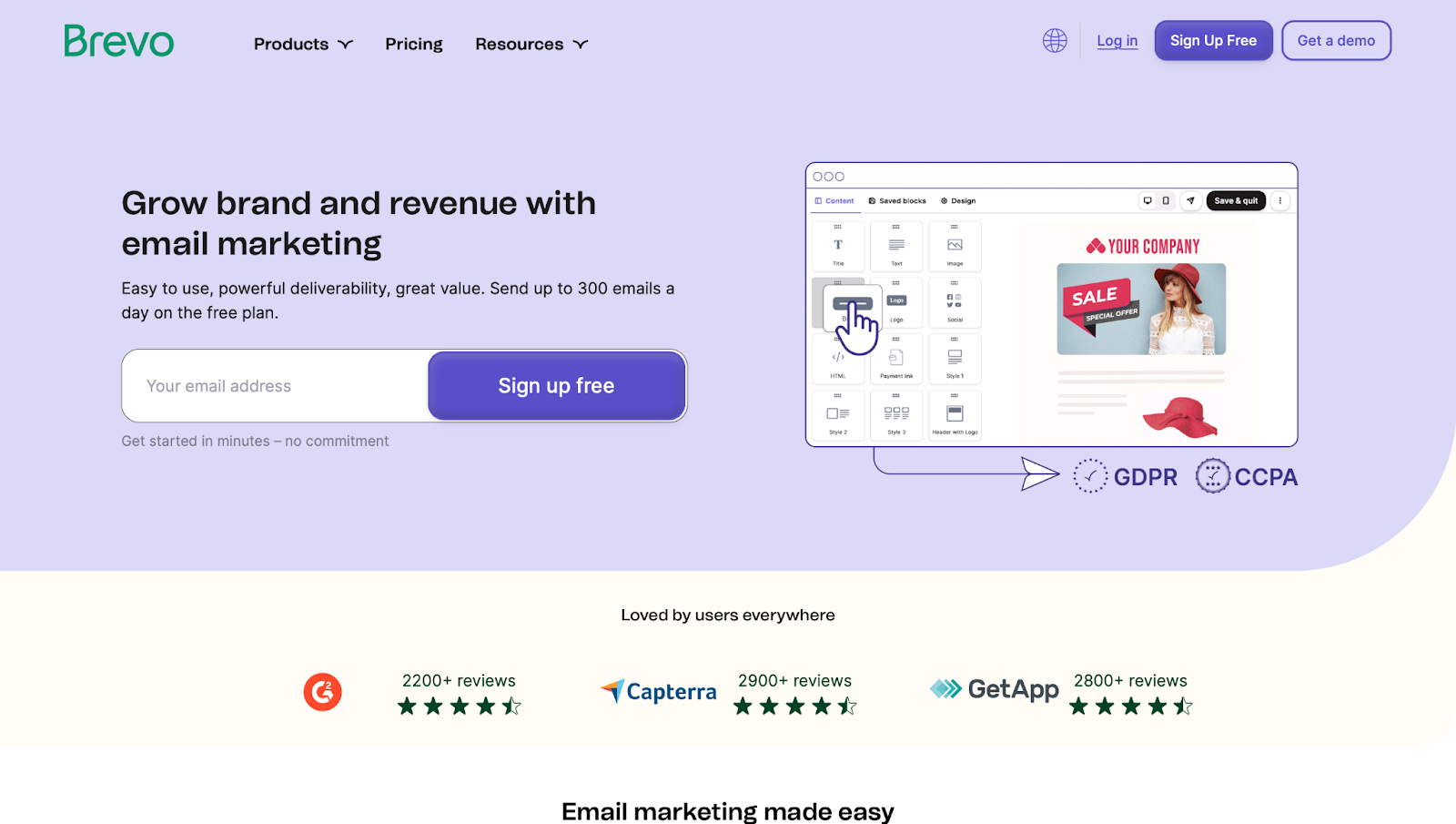
Brevo (formerly Sendinblue) is a European marketing platform (founded in 2012) that bundles email, SMS, chat, CRM, and transactional emails in one suite. Unlike many competitors, Brevo’s pricing is based on email volume instead of contact count, making it attractive for users with large lists.
- Multi-Channel: Brevo supports email and SMS natively, and also has chat/messaging (WhatsApp, Facebook) via addons. It includes a CRM for contacts. It does not have web push, but it offers a chat widget for websites and integrates with Facebook/WhatsApp for customer messages.
- AI & Content: Brevo has introduced some AI-powered features like send-time optimization and basic personalization, but it’s not heavily marketing itself on AI copywriting.
- Automation: It includes an intuitive automation workflow builder for email and SMS. You can trigger messages on a schedule or based on user actions. The drag-and-drop editor is user-friendly and lets you mix channels (email/SMS) in one sequence.
- Pricing: Brevo’s free plan allows unlimited contacts but caps at 300 emails per day. Paid plans start at $8/month. SMS and premium features are add-ons. Because you pay per email sent, you can have a very large list without incurring additional costs.
- Unique Selling Point: Pay-per-email with unlimited contacts. Brevo’s USP is that you can upload unlimited contacts and only pay for the emails you actually send. This is ideal for large lists with infrequent campaigns. It also combines email, SMS, and chat affordably – an all-in-one suite with flexible pricing.
11. HubSpot Email Marketing
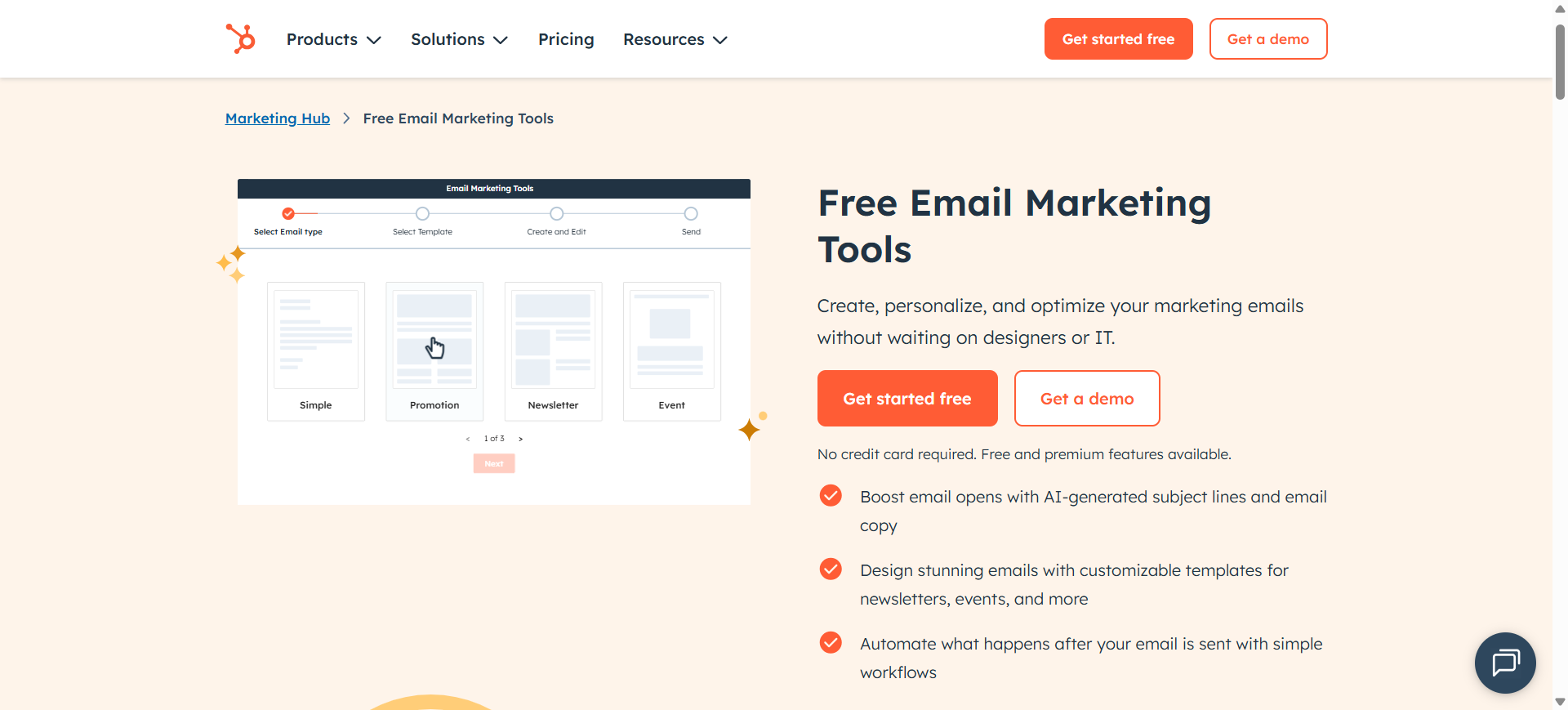
HubSpot Email Marketing is part of HubSpot’s all-in-one CRM and marketing suite, making it one of the most powerful platforms in 2026. It is widely used by startups, SMBs, and enterprises that need more than just email campaigns. HubSpot combines email marketing, automation, CRM, analytics, and sales tools in one platform – ideal for scaling businesses that want everything under a single roof.
- Multi-Channel: HubSpot goes beyond email. It integrates seamlessly with CRM, social media, landing pages, ads, and live chat, giving marketers a full 360° view of customer interactions.
- AI & Content: HubSpot leverages AI for subject line suggestions, send-time optimisation, and content recommendations. Its AI-powered CRM helps personalise customer journeys at scale.
- Automation: Advanced workflows allow automated nurturing campaigns, drip series, abandoned cart recovery, and behaviour-based targeting. You can trigger emails based on website activity, lifecycle stage, or custom conditions.
- Analytics & Reporting: Provides deep insights with campaign performance dashboards, attribution reports, and revenue tracking.
- Pricing:
- Free Plan: ₹0/month – Up to 2,000 email sends per month (with HubSpot branding).
- Marketing Hub Starter From ₹752/month per seat (annual billing) – Includes up to 1,000 marketing contacts and removes HubSpot branding.
- Marketing Hub Professional From ₹66697/month – Includes 3 seats, advanced automation, and smart content.
- Unique Selling Point: HubSpot’s biggest USP is its all-in-one CRM + marketing suite. Unlike standalone email tools, it connects sales, marketing, and customer support in a single ecosystem. This makes it ideal for businesses that want a unified growth platform.
12. Sender
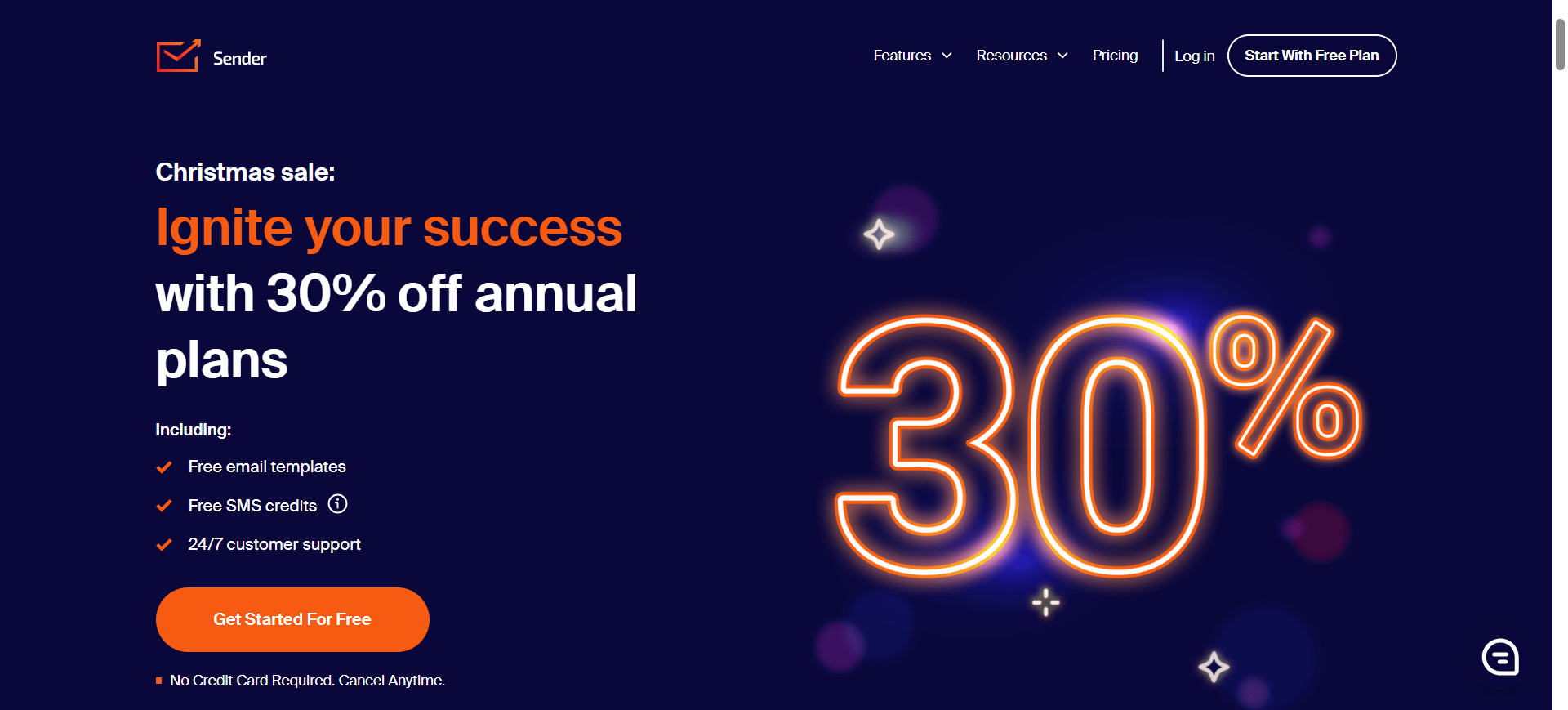
Sender is a budget-friendly email marketing platform that has been making waves since its launch. It’s designed for small businesses, eCommerce stores, and startups that want powerful email marketing features without breaking the bank. The platform focuses on delivering high-quality email campaigns with excellent deliverability rates while keeping pricing accessible for growing businesses.
- Multi-Channel: Sender primarily focuses on email and SMS marketing. It offers both channels natively within the platform, allowing you to create coordinated campaigns across email and text messages. While it doesn’t have web push notifications or chatbots, it integrates well with eCommerce platforms like Shopify, WooCommerce, and BigCommerce to automate product-related emails.
- AI & Content: Sender includes AI-powered features for optimizing send times and subject line suggestions. While it doesn’t have a full AI copywriter like some competitors, it provides smart recommendations to improve campaign performance based on your audience’s behavior.
- Automation: The platform offers solid automation capabilities with a visual workflow builder. You can create automated welcome series, abandoned cart emails, post-purchase follow-ups, and birthday campaigns. The automation is particularly strong for e-commerce, with product recommendation blocks and dynamic content insertion based on customer behavior.
- Pricing: Sender stands out with its extremely generous free plan – up to 2,500 subscribers and 15,000 emails per month (one of the most generous in the industry). Paid plans start at just $8.33/month for up to 2,500 subscribers when billed annually, or $10/month when billed monthly.
- Unique Selling Point: Best value for money. Sender’s USP is its unbeatable combination of affordability and features. Its free plan is more generous than almost any competitor (15,000 emails vs Mailchimp’s 1,000), and its paid plans remain incredibly affordable as you scale. It also boasts industry-leading deliverability rates (97%+), ensuring your emails actually reach inboxes. For budget-conscious businesses that still want professional email marketing tools, SMS capabilities, and eCommerce integrations, Sender.net offers exceptional value.”
Concussion:)
Among all the platforms reviewed, SendPulse stands out as the best all-around choice in 2026. Unlike most tools that focus only on email, it combines email, SMS, web push, and chatbots with a live chat feature in one dashboard. This multichannel reach helps small ecommerce businesses and SaaS startups stay connected to customers across different touchpoints without juggling multiple apps.
Its generous free plan (15,000 emails/month for 500 subscribers) includes automation and a landing page builder, while paid plans scale affordably as your business grows. SendPulse also integrates AI tools for writing subject lines, generating email copy, and building smart chatbots — features often reserved for pricier platforms. With its drag-and-drop builders and beginner-friendly interface, both newcomers and growing teams can get up and running quickly.
In short, while tools like MailerLite or ActiveCampaign excel in specific niches, SendPulse offers the best balance of affordability, usability, and multichannel power. And if you’re looking to expand your business further, you might also be interested in the guide to the top online course platforms of 2025, which helps you create and sell courses to your audience.
“Email marketing is not about sending more emails, it’s about sending the right message to the right person at the right time.” – Mr Rahman, CEO Oflox®
Read also:)
- What is Nonprofit Email Marketing: A-to-Z Guide for Beginners!
- What is Cold Email Marketing: A-to-Z Guide for Beginners!
- What is Shopify Email Marketing: A-to-Z Guide for Beginners!
Have you tried any of these email marketing platforms for your business? Share your experience or ask your questions in the comments below — we’d love to hear from you!